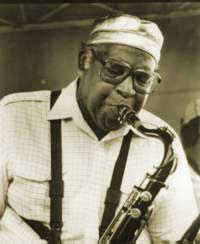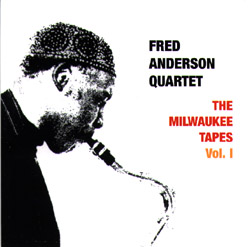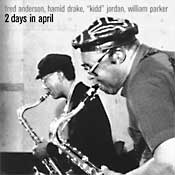
A
FIRESIDE CHAT WITH FRED ANDERSON
Are you familiar with Fred Anderson? He is a master. Better yet, do you
have a recording of Anderson? There are plenty to choose from, a couple
from Asian Improv, Eremite, Atavistic, Okkadisk, and Southport. If you
did not write your senior thesis on the tenor saxophonist, the Weekly
Roadshow is honored to present the following one on one with Anderson.
The Roadshow does it all for you, because we love our babies. It was an
honor and hopefully, it will lead you to go out and get some of Anderson's
many titles. They are worth the price of admission. And did I mention,
it is unedited and in his own words.
FRED JUNG: Let's start from the beginning.
FRED
ANDERSON: I got started by listening, by listening to players like Lester
Young and Charlie Parker, because I started back then. I didn't start
with John Coltrane. And you know, Johnny Hodges and Duke Ellington's big
band and things like that. Then I decided about 1945, just after the war
that I wanted to play. The person that inspired me the most, that I thought
had a real interesting voice, was Charlie Parker. He originally was the
one that started me playing music, but I didn't know what was in store
for me because I would just listen to his music. I didn't realize that
it was a lot of work involved to do what he was trying to do, to do what
he had done at that particular time.
FJ:
What was it about Bird?
FRED
ANDERSON: Well, it stuck out because he was singing through the horn.
It was just like he was talking to you, not that other players weren't
doing the same thing. He had a way of speaking that nobody else was speaking
at that particular time.
FJ:
You too have been criticized for that type of melodic lyricism.
FRED
ANDERSON: Yeah, well, maybe that's where I got it from. I listened to
him a lot during my formative years.
FJ:
You were there during the conception of the AACM in Chicago, how did the
collective come to pass?
FRED
ANDERSON: It was just an idea that Muhal Richard Abrams had. I first heard
it from him. We were in a club on the west side of Chicago at the time.
We were talking and I was telling him that I written some exercises for
myself to play. I was trying to compile it to make a book out of it and
that's what he said that we should start a charitable organization called
the Association for the Advancement of Creative Musicians and he was one
of the first people that I discussed that with. It was with nobody else.
It was with Muhal himself. We had that conversation. I remember that conversation
very clearly. And then after a while, I don't know how long after that,
I was notified that there was going to be an organization and they had
a meeting. I may not have been at the first meeting, but I was at one
of the early meetings of the AACM. We formed and got the bylaws together
with the state as a non-profit organization. They had everything down.
I can't remember all the bylaws, but they had a school and they were teaching
and at that particular time, I think he was involved with the school he
was teaching because I even took a few classes from him myself.
FJ:
What was the mission statement for the AACM?
FRED
ANDERSON: Well, the main goal was the same as they are now, to work with
the community, have a school, and just do things for the community. Tell
musicians to write their own music and a lot of the musicians that you
hear today came out of the AACM school.
FJ:
Do Chicago tenor players have a readily identifiable sound?
FRED
ANDERSON: I don't know, well, yeah, I do know, maybe so. Everybody says
that that we have a certain sound because going back to sound that made
a big impact on me as far as sound of the tenor was Gene Ammons. I've
known nobody in the world that had a bigger sound on tenor than Gene Ammons.
But he was the one that really got me interested in sound, to get real
deep down inside of yourself and play from the lower part of you.
FJ:
Has that been one of the key components in your unique approach?
FRED
ANDERSON: The key to being good on any instrument is learning as much
about the instrument as you possibly can. Don't get hung up with all these
different sounds that people get out of it. Learn how to get some clear
notes out of the horn. If you work a job, if you work a show, you have
to play inside the horn. You have to play where the music is at. Now,
you can do all of these things. I'm not saying you shouldn't do them.
You can do them, but those are effects. It is sort of like an effect thing.
I mean, I learned all those devices. I learned them. But I learned those
back in the Seventies before they were fashionable. I heard Illinois Jacquet
use those devices back in the Forties. So I knew about them. They were
talking about it then. "What is he doing?" "How is he playing those high
notes up there off the horn?" But after a while, it got to be fashionable.
Eddie Harris wrote a book on top tone. I had a book about top tones and
using harmonics or one note playing and playing two or three notes off
of one note.
FJ:
Do you think you will ever stop learning?
FRED
ANDERSON: No, it's just like life, you never stop living. You never stop
learning things about life and so that is the same thing with a player.
It's about your life anyway. It is not a separation in your everyday function.
Whatever you do in that day, that's going to come out in your music whether
you realize it or not. Whatever happens at any given moment, any given
time in your life, or any problem you have, it will come out in your music.
FJ:
Having said that does jazz have the spontaneity of life?
FRED
ANDERSON: Well, it's almost. There are certain things you have to know.
Music itself, you have to learn a certain amount to give you some kind
of direction. But you can apply that to your life. You don't think about
a lot of the technical things and just start playing how you feel, but
you have to get to a certain point technically in order to do that.
FJ:
Let's touch on the Velvet Lounge. Why did you decide to become the proprietor
of a bar?
FRED
ANDERSON: Well, I had a place before called the Birdhouse in Chicago.
There used to be a Birdhouse here, but they went out of business and I
took the name because I could do it because they were out of business.
So I called it the Birdhouse. I had a place on Lincoln Avenue on the north
side of Chicago. It was a space where there was no alcohol, just music.
And I had trouble trying to get some license, public place for amusement
license. I never took the time. This was back in '79. In the neighborhood
I was in, I wasn't really welcome, so we had a lot of problems. We never
did get open. It was a non-profit organization. I still got that charter
right now. I still got that no-profit corporation. I'm hoping to use it.
But here, it is different. I pay taxes. I am right with the bureaucracy
now (laughing). So when I opened this place, it sort of fell in my lap.
I was working here for a buddy of mine, and we always considered ourselves
brothers. We was raised up together and he passed away. I was running
the place while he was in the hospital and what happened was when he passed
away, the owner of the building called me and asked me if I wanted to
take the store from him and I told him that I would. He just wanted to
know if I qualified and fortunately, I had just sold my house and I had
some money. I didn't do nothing with the money. I was just holding this
money. I was wondering what I was going to do with it. I didn't want somebody
to suggest that I should buy another condo for myself. I was divorced.
I had just gotten divorced. So I said that I would just take a chance.
So I invested a small amount of money. The pictures and everything were
already here. It was just a great opportunity.
FJ:
Quite a resume change to go from artist to bar owner.
FRED
ANDERSON: Any kind of business, you run into a lot of different things,
Fred. You have to deal with all the things that go with it. You have to
deal with taxes. You have to deal with just the whole bit. This thing
started out, not as a jazz club. It started out as a neighborhood bar.
That is what it was and that is how I kept it for a long time, from '82
up until '93. Then I decided things started changing. When you have been
in a place for a long time, the neighborhood changes, your customers move
out, some of them don't drink no more, some of them pass away, and then
the drug scene came about and there was no particular drug because everybody
was on crack cocaine and heroin and stuff like that. You didn't have any
potentially young customers and when the old customers drank themselves
and they couldn't drink no more. Things just fell down and so the only
thing that I thought about is I should have some music in here, me being
a musician myself and me playing. I never did stop playing. We used to
have jam sessions in here every other Sunday back in the back and I would
just come out of my pocket and pay the musicians a little money so I could
keep a rhythm section going.
FJ:
Those jam sessions have developed into a regular gig at the Velvet Lounge.
FRED
ANDERSON: Oh, yeah. I play regular here all the time. I don't do too much
playing outside unless it's something special that comes up because I
can play here and draw revenue in here. Now, I am in a good position because
I have got records out and we're on the internet and everything so people
can come check us out and we play. We get decent crowds in here every
time we play.
FJ:
Let's touch on some of your recent releases, first, Birdhouse on Okka
Disk.
FRED
ANDERSON: That was done in the studio. Studio work works pretty much like
we do on stage (laughing). We had certain tunes that we played. There
is a lot of tunes that we played that wasn't on that album. There is probably
some more material to make another album. We picked the tunes, especially
that "Birdhouse" tune. That was a tune that I wrote while I had the Birdhouse.
So I said, "Let's do the 'Birdhouse.'" We did about four or five takes
on it. That was one of the best takes and we decided to use that particular
take. Maybe the other takes are all right too. "Like Sonny," a lot of
people said that they thought it was Sonny Rollins, but it is really Sonny
Stitt. That was my interpretation of a tune that I heard that I heard
him play years ago and so I said it was something "Like Sonny." This sounds
like Sonny Stitt like he would write a melody, but I did it my way. So
that's what that was about. That other one, "Waiting for MC," one of the
tunes on the record, we were in the studio waiting for Marilyn Crispell
(laughing). We were in the studio and she was supposed to meet me in the
studio. We just started playing and it just so happened that the engineer
turned the tape on. I didn't even realize that he was recording it. That's
how that came about.
FJ:
Your thoughts on the album you recorded with the DKV Trio.
FRED
ANDERSON: I want people to realize that Ken's got his voice and I've got
my voice. He's got his roots and I've got my roots. So people have to
realize that. I don't compare him with me and he don't compare himself
with me either. We've both got our roots in the music and we both come
into the music like we see it. Even years ago, let's say for instance,
when Louis Armstrong was in Chicago, there was a trumpet player around
called Bix Biederbecke. Bix Biederbecke had his voice and Louis Armstrong
had his voice and they admired each other. So this is probably the same
kind of relationship we got. We both admire each other. He got his voice.
I got my voice. I just did an album on Eremite with Kidd Jordan. He's
got his voice and I got my voice, so it doesn't really have anything to
do with what I think. Ken is serious about his music and I'm serious about
my music and I respect him and he respects me and that's all. A lot of
times, they try to stir up things. They try to make it sound like a sports
event. This is artists and this is a person expressing himself the way
he feel like he could express himself from whatever kind of point of view
that he comes from. So this is what we do. I know who I am. He knows who
he is. I know my roots. He knows his roots. So we just played some music.
So we did a DKV Trio with that thing in mind and that's the end of that.
I know people want to stir up a lot of controversy about this and a lot
of this and about that and we're living in times now where we don't need
that.
FJ:
Controversy sells magazines.
FRED
ANDERSON: Well, they have to have something to write about (laughing).
They write they think is cool or will sell magazines and get paid for
it. We don't get a dime from it. We get the publicity and the notoriety.
It may help us sell a few records, maybe and maybe not.
FJ:
I don't know any writer that makes much more than a dime.
FRED
ANDERSON: They do what they should be doing, so it is up to us to keep
on doing what we're doing.
FJ:
And the latest on the Atavistic label as part of their Unheard Music Series,
The Milwaukee Tapes Vol. 1. Hamid Drake is a member of your quartet.
FRED
ANDERSON: Yeah, right. We're still playing together. Those were some of
his formative years. That done in the formative years of his career. If
he sounded like that now, you can imagine what he sounded like then.
FJ:
Should we be expecting a Vol. 2?
FRED
ANDERSON: I'm sure there will be. There is enough music for a Vol. 2.
FJ:
And the future?
FRED
ANDERSON: I have a record coming out
with Asian Improv.
Fred
Jung is Jazz Weekly's Editor-In-Chief and misses the good ol' days of
sitcom TV. Comments? Email
Fred.


